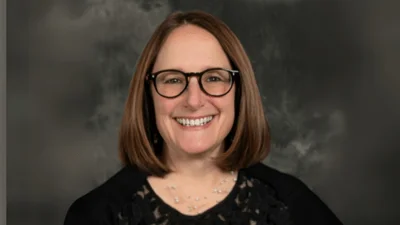Thomas M. Siebel Center for Computer Science issued the following announcement on Sept. 18.
When he arrived at Illinois Computer Science in 1979, Doug MacGregor was a man in a hurry.
Coming out of the U.S. Navy, MacGregor was already married and had a young child. He wanted to get an advanced degree and needed to get to work as soon as he could.
But in his 18 months at Illinois, MacGregor (MS CS ’80) found more than a path to a job. He found tools and support that would steer him onto the winding, rewarding road he’s still on today.
“There aren’t too many straight lines,” MacGregor said, laughing about his unconventional path, one that as of this year includes an Illinois CS Distinguished Alumni Achievement Award.
At Illinois, Doug MacGregor found tools and support that would steer him onto the winding, rewarding road he’s still on today.
He ventured to the then-developing tech hub in Austin, Texas, then to Japan – for school and work – and on to Colorado, Boston, and Austin (again), before landing in his current home, Western State Colorado University in the Rocky Mountains.
Along the way, he worked for Motorola and Dell Computer, co-founded a joint venture with Matsushita, and earned his PhD at Kyoto University, one of the first Americans to do so. He also co-owned an Arena Football League team (it failed), and went back to school in his 60s to add another master’s degree (he succeeded, graduating in 2017 from Johns Hopkins).
Two Illinois CS professors in particular helped MacGregor find his way, and he has never forgotten them and their key roles in his success.
MacGregor provided the gift to Illinois Computer Science that endowed both the Saburo Muroga Professorship in Computer Science and the Michael Faiman Professorship in Computer Science.
Faiman was MacGregor’s thesis advisor, and pointed him toward a project that involved Motorola’s 68000 series of microprocessors.
But when Motorola came to campus to recruit, the company mistakenly bypassed CS students, MacGregor said. That changed with a call from Muroga.
“So his proactive concern about a student is actually how my whole career got launched,” MacGregor said.
He would eventually land a job and become the microcoder and micromachine architect for Motorola's MC68010 and MC68020. Based on that work, MacGregor was awarded 24 patents and the IEEE Browder J. Thompson Memorial Prize Paper Award.
A few years later, when MacGregor was drawn to Japan with the idea that he would either work or go back to school, Muroga again offered a guiding hand, suggesting he do both.
“He called up some professors at Kyoto University,” MacGregor said. “My oral exam and thesis presentation were five hours of the worst Japanese ever spoken.”
After MacGregor returned to the United States he became a vice president of products and procurement at Dell back in Austin. When he left Dell, he joined Harvard Business School as a research fellow focused leadership, after which another sort of opportunity came along, part-ownership of the Austin Wranglers in the now-defunct Arena Football League.
The team folded after just a few seasons for a simple reason, according to MacGregor – “The expenses were greater than the revenue.”
He called the experience a lot of fun, and “a good lesson in humility for me.”
Most recently, MacGregor found his own calling to teach. An adjunct professor, he created the cybersecurity program at Western State Colorado University in Gunnison.
But he believed he needed a technical refresher, and enrolled in the online master’s program at Johns Hopkins, studying cybersecurity.
After years of working in management, “it doesn’t take long before you’re out of shape technically,” MacGregor said.
Now at a school focused entirely on teaching, he looks back on the degree to which Muroga and Faiman, both serious researchers, made themselves available as teachers, too.
“They were never stingy with their time in terms of the teaching aspect,” MacGregor said.
Original source can be found here.

SOURCE: Thomas M. Siebel Center for Computer Science


 Alerts Sign-up
Alerts Sign-up